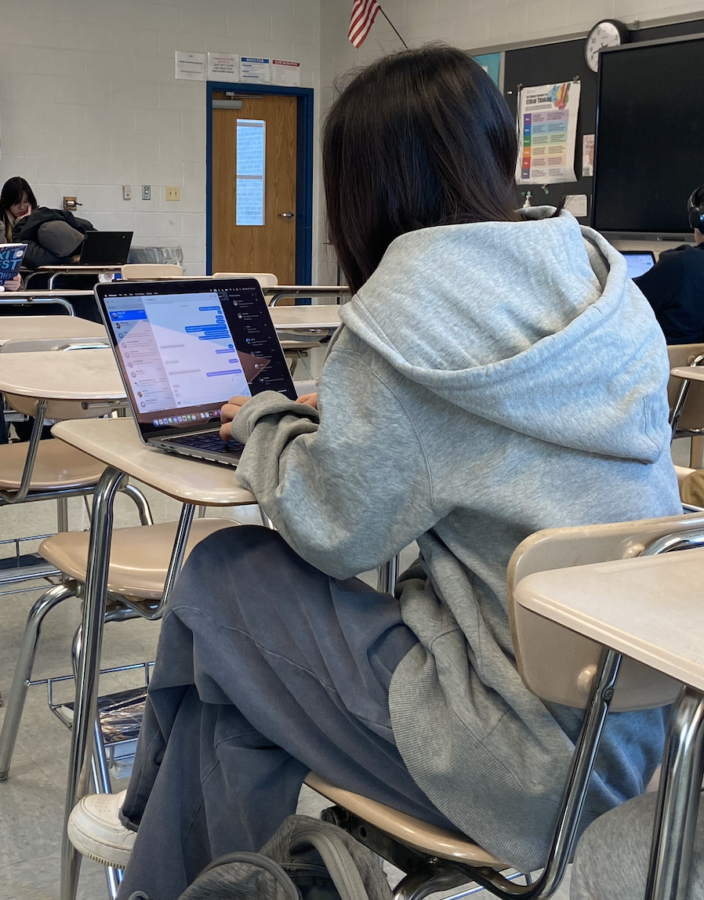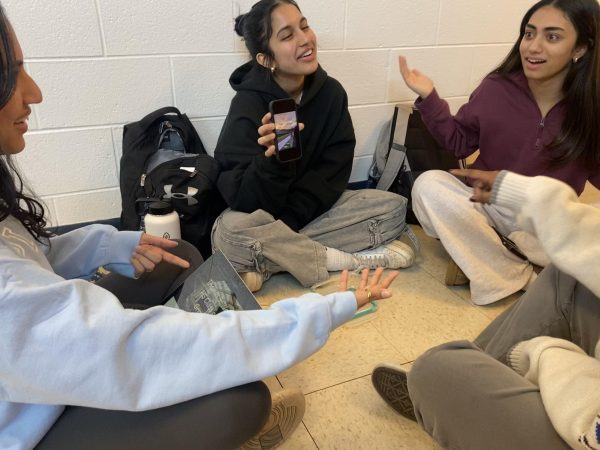Senioritis spreads rapidly through school
Senior Stacy Sun texts on her computer while class is in session.
Senioritis is an informal term that describes the lack of motivation or academic performance that can occur during senior year of high school. This phenomenon is associated with students feeling “burnt out” after several years of intense academic work, combined with the excitement and anticipation of going to college. As a result, seniors may become more disinterested in their schoolwork, attend fewer classes and become less engaged while in the classroom.
As the school year approaches its end, senioritis spreads like wildfire from senior to senior. This epidemic of lack of enthusiasm in the classroom has caused problems for students, teachers and staff as they must deal with the repercussions of this disease.
The first issue that senioritis causes is a significant drop in grades. As seniors get accepted into their respective schools, their high school GPAs typically do not have an effect on their lives anymore. With this being known to seniors around the school, it is typical for the average senior GPA to drop during the second semester. With that being said, relaxing a little bit at the end of senior year is OK, but it is still important to be cautious as colleges have every right to rescind a student’s acceptance to their school if deemed necessary. “After I got into college, I have gotten really lazy as I barely do any work because my grades do not matter. My grades, although, have dropped only slightly, so I don’t think I will be changing my work habits any time soon,” senior Luke Danielian said.
The second issue that senioritis causes is a lower level of attendance in class. With seniors not having to achieve the highest level of grades in their classes, they are prompted to not feel it is necessary to attend classes. This lack of attendance causes a disturbance in the flow of the class, as students and teachers must spend time making up late work and assessments. This is especially prevalent in senior-dominated classes such as AP English Literature and AP Statistics. “It definitely hits hard during the first period. It affects me personally as I have to repeat what I say. I feel that when things are for completion, people tend to not do it and can see the trend of grades trickling downwards,” English teacher Andrew Potvin said.
The third issue that senioritis causes is a lack of focus in the classroom when students are present. As grades matter less and less, seniors feel little obligation to pay attention in class. This causes them to sit on their personal electronic devices such as phones or laptops as they feel the material being taught to them is not interesting. This is even more prevalent with the implementation of electronic learning as students can easily switch tabs to other classwork or games during class time.
This lack of respect and lack of focus is starting to disturb classrooms as classwork is not being completed and students are not paying attention to the information being taught to them. “After I got into college, I feel like I have not been paying attention in my classes as much as I should have. I have started to play chess during a lot of my classes, which draws me away from the information being taught to me,” senior Parker Leibowitz said.
Your donation will support the student journalists of Thomas S. Wootton High School. Your contribution will allow us to purchase equipment and cover our annual website hosting costs.
Sean is a 2023 graduate.







![Junior Grace Song rewatches the trailer for Anora. Promoted as "A Love Story from Sean Baker," it is the eighth feature film under Baker's belt starring Mikey Madison in the titular role. "[Anora] accurately represents women overseen and easily taken advantage of. It emotionally enticed me. The ending is so good," Song said.](https://woottoncommonsense.com/wp-content/uploads/2024/11/Rc5RQTdjtUFtyT7IyQe1rSxkpOTc6NoksY8jtoop-e1732201365565-600x450.jpg)